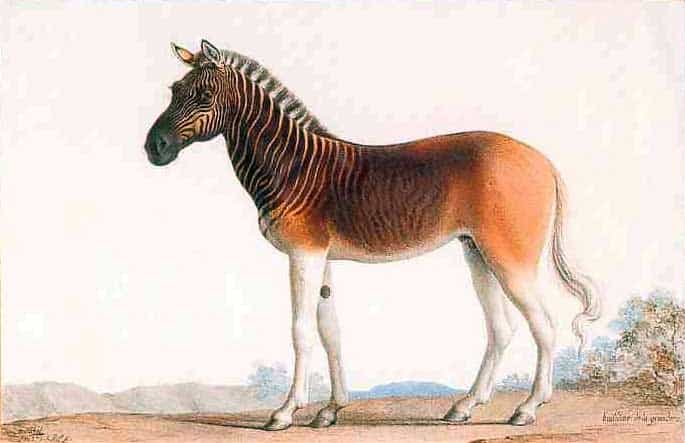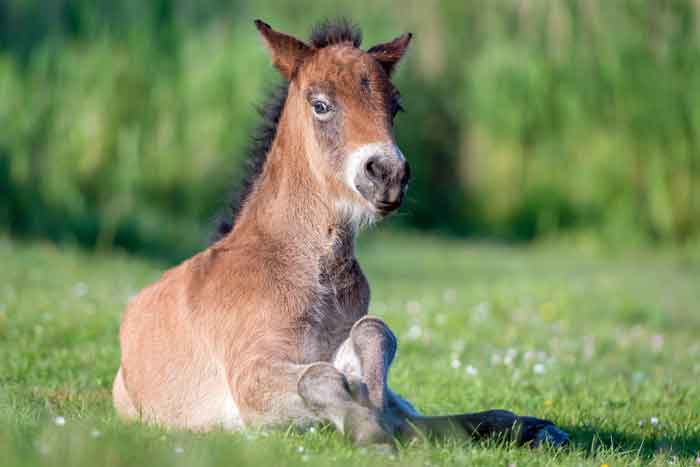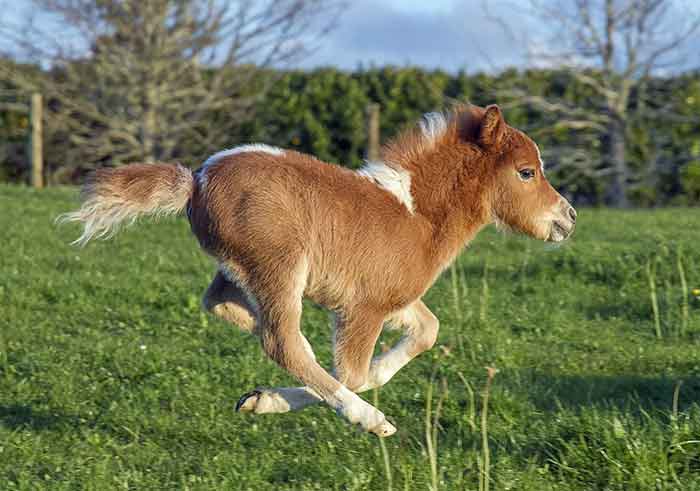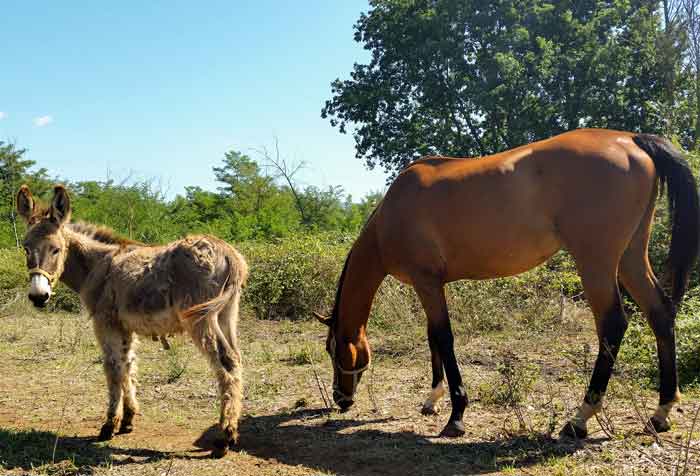If you own horses, you might be wondering what is best for them in the wintertime.
If you live somewhere that experiences harsh winters, you will want to make sure you are doing the best that you can for your horses.
Table of Contents
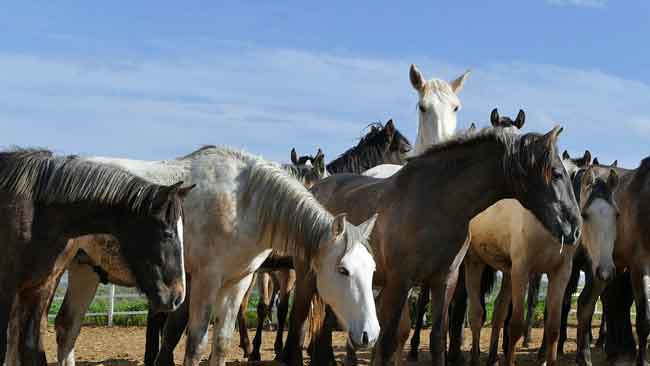
Are Horses Generally Ok in the Snow?
Even though we think winter weather can be cold and uncomfortable, horses are better equipped to deal with cold weather than we are.
Humans are comfortable in weather that is between 50 to 85 degrees Fahrenheit (10 29.4 degrees Celsius) to but horses can be comfortable in weather temperatures that reach a low of 15 degrees Fahrenheit (-9.4 degrees Celsius).
This means that horses can be perfectly comfortable in low temperatures and even snow.
Can All Horses Handle Snow and Freezing Weather?
All horses can handle the cold and freezing weather up to a certain point. Most breeds can only handle about 15 degrees Fahrenheit (-9.4 degrees Celsius) before you need to worry about them.
Some breeds can handle even colder weather as long as they have a very heavy and thick winter coat.
Like people, horses have to acclimate.
If your horse is not used to living somewhere that has harsh winters, they will not handle the transition as well as horses that are used to living somewhere that experiences extreme winters.
Horses will also have to deal with the transition from summer to winter. When your horse is used to warm temperatures, it will take time for its winter coat to come in and to acclimate to the proper temperature.
Horses to Look Out For:
Even though most horses can acclimate themselves to deal with colder weather, there are still some horses that you will need to keep your eye on.
Some horses that you will want to pay extra attention to in the winter include:
- Horses that are elderly
- Horses that are very young
- Horses that are sick
- Horses that are extremely thin or skinny
If you have any horses that should not be left to acclimate themselves to the weather from the list above, you should bring them into deep-bedded stalls to keep them from the dangerous chill.
Don’t worry about your barn being warm or airtight. Most often getting horses out of the wind is enough to help them stay warm.
Having an airtight barn is not ideal for your horse and you will want to make sure they get the proper outdoor air.
How Long Can Horses Be Out in the Snow?
Horses can be kept out in the snow for as long as the temperature is an acceptable level and they aren’t getting too wet from the precipitation.
When horses get wet, their internal temperature can be compromised. This is because the moisture can flatten down the horse’s coat and can create a chill for the horse.
It is best to provide a horse with a shelter that they can go into to protect themselves.
How Cold is Too Cold to Ride a Horse?
If you are interested in riding your horse in the cold temperatures, you will want to make sure that you follow certain guidelines.
Even though horses can be out in the cold, it doesn’t mean that it’s always a good idea to ride them.
Horses have a specialized respiratory system that helps to warm and humidify the air they breathe in before the air gets to their lungs.
If you take a horse out for any exercise that is more intense than a walk, they will have to take more breaths and this process does not get the time that it needs to warm up the air that they are taking in.
It is also not advised that you over-exert your horse in the cold because they already have a sped-up metabolism due to the cold weather.
It is best for your horse that you do not over-exert them when the temperature drops below 25 degrees Fahrenheit (-3.9 degrees Celsius).
How Do You Know When a Horse is Too Cold?
If you are worried about whether or not your horse is too cold, there are some signs that you can look out for.
These signs include:
- Visible shivering
- They don’t have a thick winter coat
- They aren’t eating as much as they should be
- They are huddling with other horses
- They are visibly too skinny
If you cannot tell if you are accurately observing the signs that your horse might be too cold and you want a way to be sure, you could always take their temperature.
A horse’s temperature should not be below 99.6 degrees Fahrenheit (37.6 degrees Celsius).
Do Horses’ Feet Get Cold in the Snow?
Horses have a thick coat that protects them from the elements and helps to acclimate them from being too cold in the snow.
But what about their feet?
Horses’ feet, though it might seem like they get cold standing in the snow, they do not.
A horse’s leg, below the knees and hocks, are made of tendons and bone. Neither tendons nor bones freeze or become cold easily.
Horses even have natural mechanisms to alter their circulation patterns to preserve their warmth.
Should Horses Wear Blankets in the Winter?
One thing that you need to be careful with when taking care of your horses is when you should or should not put a blanket on your horse.
Putting a blanket on your horse when they do not need it. If you put a blanket on a horse that has a heavy winter coat, you could compress the horse’s coat which will ruin its ability to naturally insulate itself.
If you choose not to blanket your horse, you will want to keep an eye on the wind. Even a horse with a thick coat can be cold in the wind. Wind can ruffle your horse’s hair which can mess with the insulating layer of warmth that the horse has created.
You also want to make sure that during wet weather your horse has somewhere to go to protect themselves from the elements.
Can Horses Be Out All-Year-Round?
Horses cannot be out all year long if the weather becomes too harsh. Just because they are able to withstand cooler temperatures than we are, doesn’t mean they should be out in extreme weather.
Horses prefer to spend their time outdoors but will need shelter when the weather gets too cold. You will have to provide shelter for your horse on the pasture that they can use when they need to.
You will also want to make sure that you have a fully stocked barn with the necessary equipment to keep your horse comfortable.
Horses should be brought inside if the weather is below 18 degrees Fahrenheit (-7.8 degrees Celsius).
What Are the Best Horse Breeds for Cold Weather?
While all horse breeds can survive in cold weather, there are some that are naturally better suited to handle the tough winters.
These breeds include:
Icelandic Horses:
These horses weigh around 800 pounds and are short, stocky, and furry.
These horses are the only breed of horses that are present in Iceland and are used for herding, riding, or leisure.
Yakutian Horses:
These horses are short and compact.
They are the only horse that is capable of surviving in the Arctic circle. They have thick manes, tails, and a very thick winter coat.
These horses have been known to survive temperatures of -94 degrees Fahrenheit (-70 degrees Celsius).
Fjord Horses:
These horses can weigh between 900-1,200 pounds. They are good for winter weather and come from Norway.
Even though there are some horses that are better suited to cold weather, that doesn’t mean they are the only horses that can survive in the cold.
The main thing you need to know, no matter what breed of horse you have is to monitor your horse when the weather gets cold.
Make sure that their winter coat is doing the trick and keeping them warm. If it is not, you might want to consider covering them with a blanket.
How to Care for Your Horses in Cold Weather:
In addition to keeping an eye on how your horse is handling the cold weather, there are other things you can do to make sure your horse is comfortable in the cold winter months.
Horses will need plenty of food and water during the winter.
To stay warm, horses’ metabolisms increase to keep their body temperatures warmer. This means you have to up a horses’ food intake.
It is recommended that horses must have between 15-20 percent more calories for every 10-degree drop in temperature once the temperature gets to 30 degrees Fahrenheit (-1.1 degrees Celsius) and below.
When you give your horse more calories, it is best to give them hay instead of grain.
You will also need to give your horse more water during the wintertime. Snow is not a good source of water for your horse. Snow requires more energy to consume than water and can lower your horse’s internal temperature.
You will also want to make sure that your horses’ water is warmer than usual. Horses will not drink as much water as they should in the winter if it is too cold because this will also lower their internal temperature.
It is shown that horses will drink more water during the winter if it is warmed to between 45-65 degrees Fahrenheit (7.2-18.3 degrees Celsius).
With the proper care, attention, and monitoring, you should be able to leave your horses outside for the majority of the winter.



